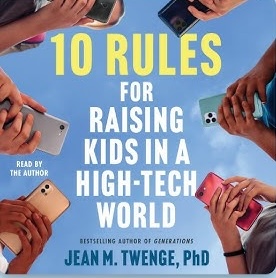
It’s in my face everywhere people look biologically tethered to their devices; what is this? Jean Twenge’s 10 Rules for Raising Kids in a High-Tech World reflects a new reality. I thought I already knew the script: too many faces and minds sucked into devices and external attention switched off—initiating every conversation is effortful. But Twenge adds some nuance and trend analysis to our understanding. She notices what childhood has become, and she invites you to notice and nudge the culture with her.
One of the early stories—about an eleven-year-old who finally gets her first smartphone and then slowly drifts away from the things she once loved— quietly resonated. Not dramatic, not catastrophic, just… gradual. A dimming. And as I read it, It reminded me of the way the world has changed. Twenge bolsters her stories with graph after graph—visual after visual—demonstrating how abruptly the world of adolescence actually shifted around 2012, right when smartphones stopped being accessories and became appendages. The curves she presents—teen depression, anxiety, loneliness—don’t drift upward; they bend, sharply. And seeing those visuals laid out so plainly made the pattern far more tangible than any intuition ever could.
Coming off those stark visuals, the shift into her practical advice felt almost like an exhale—a gentle recalibration rather than a reprimand for parents and society. And her advice is simple yet powerful. No devices in bedrooms because sleep is the body’s emotional scaffolding. Delay social media because younger teens don’t yet have the neural wiring to metabolize the comparison loops and social pressure. Give a basic phone first because independence should grow before exposure accelerates. She weaves these ideas together with small scripts—what to say when your child claims everyone else is on Instagram, how to hold your ground when a group chat becomes a lifeline. These tiny, practical details reminded me that she’s observing real families, not theorizing as an armchair academic.
And then there’s that underlying mantra “half the rules half the time” helps. I kept returning to that. It’s such a simple release valve for the guilt so many parents carry. It’s not success or failure its nudging.
I also found myself reflecting on her call to restore real-world freedom. Kids used to roam, wander, play, risk, return. The basics of building connections and a sense of bravery. Now their freedom is often digital, not lived. Twenge threads together evidence that as in-person time has declined, anxiety has crept upward—not because kids are more fragile, but because they’re less practiced at handling the world without a screen smoothing the edges. That idea stuck with me. It’s not about a battle against our children it’s a quiet warm invitation to let them grow.
The school stories may be the hardest to read, mostly because they feel so familiar (even in college classrooms and office hours). Teachers spending entire periods policing phones; students scrolling in their laps; kids filming classmates without consent; lunchrooms falling silent as everyone looks down. Twenge pairs these scenes with international data showing that countries with the highest in-school device use have seen steep drops in PISA scores. It’s startling. But again, the solution she offers isn’t nostalgic—it’s grounded. Phone-free school days don’t restrict kids; they return them to the room.
What I felt most throughout the book is Twenge’s tone. Steady. Humane. She never positions herself above parents. She doesn’t shame or scold. She knows exactly how hard this feels—how bizarrely countercultural it is to tell your child they need to wait when everyone else seems to be sprinting ahead. She writes like someone who has sat with hundreds of these conversations, someone who understands how vulnerable it can feel to be a parent in this moment.
By the end, it became clear the book isn’t truly about screens. It’s about reclaiming the small, essential moments that make a childhood healthy and whole—sleep, face-to-face friendship, imagination, boredom, presence—the lost basics. Twenge doesn’t ask for perfection. She asks for intention—even if it only shows up about half the time.
And reading it, I felt a kind of sturdy hope. Not that technology will suddenly soften its grip, but that we’re not powerless in the face of it. You can change one habit. One routine. One boundary. And the path forward, surprisingly, is not radical. It’s simple, human, steady. In fact, perhaps this disruption from technology can help remind us about what is valuable and taken for granted.
Maybe that’s the quiet power of this book: it doesn’t lecture. It lights the way. And then it trusts you to take the next step.





